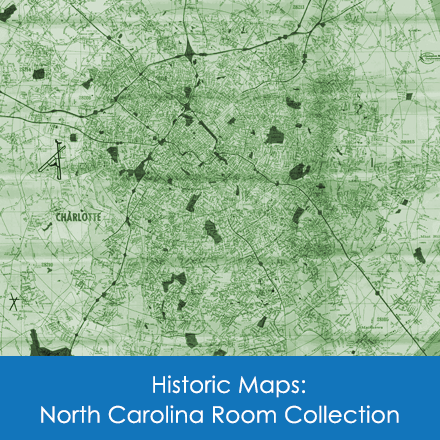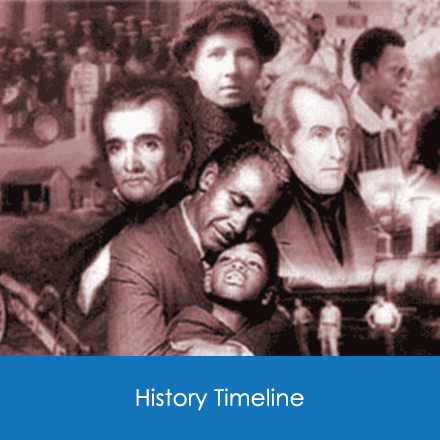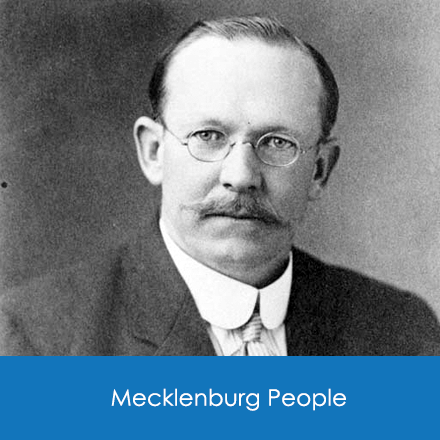You are here
Colonial Period
SOCIAL historians studying the more than two-century story of Mecklenburg might well agree that this community's character has its roots in the independent-mindedness of her early citizenship. Theirs was a continuing struggle to achieve and maintain a new way of life.
In the beginning the fight was against the wilderness itself. With the exception of the Indians, the first settlers were the most self-sufficient residents Mecklenburg ever had; they were the original exemplars of live-at-home. None had less with which to begin building, none in this region's history would achieve more.
At their coming into the back country they had found no accouterments of civilization. All about them was land, millions of acres of virgin great forests and open prairies waist-deep in luxuriant grasses, and streams flowing with clear water, for the eroding plow had not yet disturbed the rich red soil. On all sides magnificent distance rolled; westward it swept toward the unknown country of the Cherokees. Over the land was a golden silence their children of two centuries later would never experience, a solitude disturbed but now and then by the sharp bark of a fox or the bellow of an enraged buffalo or even sometimes the eerie howl of a wolf. And above this vast quietude by day was the inverted immense blue bowl of the heavens and by night the myriad stars. They had come into a good and lonesome land.
No roads cut through the forests and grasslands; only animal paths and Indian trails disclosed movement. There were no cleared fields. Trees had to be cut or grass burned off before the settlers could prepare land for planting crops. There were no houses, no blacksmith shops, no mills to grind the grain that would be raised, no schools, no churches, only the land and the streams and the blue sky above, and solitude and freedom and peace.
But there was a living to be won.
Those settlers had great courage, a stamina that would not yield, and much faith. They were willing and eager to work and create and build. They began to wrest a civilization from this wide wilderness, and houses and mills and churches and schools were soon pushing back the frontiers. And under the preaching of Parson Craighead and the leadership of such stalwarts as the Alexanders, the Davidsons, the Brevards, and young Hezekiah Balch of Poplar Tent, they rose up to challenge the authority of England.
One of the first troubles to arise in the back country was over land and taxes. At the time Mecklenburg County was established in 1762 by being sliced off the western portion of Anson, the southern boundary line of North Carolina had not been run definitely; the survey westward had ended south of Salisbury where the line between the Carolinas touched the road leading from Salisbury to Charleston. So, during the next several years when efforts were made to collect the taxes, come Mecklenburgers living in the vicinity of where this line if projected westward would run were a source of much trouble to the tax collectors. If North Carolina sheriffs sought to collect their taxes, those persons insisted that they were in South Carolina; if the collectors were South Carolina officers, they maintained with equal insistence that their homes were north of the line.
In the eastern counties and the middle regions of the province, Tryon's officers were being charged with corruption and extortion, the citizenship was rebelling against these officials, and the situation had so deteriorated that in Orange, Anson, and Rowan the citizens were banning together in an attempt to regulate their affairs. Soon they had come to be known as Regulators.
By early 1771 the Governor and the Regulators had reached an impasse. Tryon was determined to crush the regulation movement; the Regulators were equally adamant in refusing to submit to what they insisted was corrupt and oppressive government. The Governor sent General Hugh Waddell through Rowan and Mecklenburg to enlist troops, but few volunteered and these were never able to join Tryon. At the Yadkin near Salisbury they were turned back by a large force of Regulators who had assembled there to air their grievances and demand that the corrupt practices of the Tryon government be ended.
But it was to the dramatic exploit of nine young Rocky River men, rather than to this incident in the growing turmoil between the Royalist officials and the Regulators, that history and tradition have paid considerable attention. It was this reckless escapade that history would record as one of the first overt acts against royal authority in all the colonies.
On the night of May 2, 1771, not far from present Concord, wagoners bringing gunpowder and bullets from Charleston to General Waddell had camped on Phifer's Hill. These men had eaten their suppers and were asleep when the nine youths, with their faces blackened and otherwise disguised, slipped up to the ammunition wagons, laid powder trails out from them, and set fire to the powder. A moment later in the commotion of the exploding ammunition the nine "Mecklenburg Black Boys," or "Cabarrus Black Boys," as later would be called, made their escape.
Two weeks after the burning of Tryon's powder - on May 16 over on Alamance Creek near present-day Burlington - Tryon and the Regulators clashed. Tryon, victorious over the poorly equipped and unorganized Regulators, ordered the hanging of a slow-witted boy named James Few, and several days later, after exhibiting them about the country manacled, hanged six others. Tradition says that among these fighting Regulators at Alamance Creek were several Mecklenburg men who brought back an account of the Governor's harsh treatment of the captives. At any rate, Tryon's administration of his office, culminating in his attack on the Regulators and his conduct afterwards, further inflamed the back country against him.
Resentment against Tryon and his royalist government had been building in Mecklenburg despite the fact that within two years after Charlotte's incorporation he had recommended to the Assembly that it establish "a public seminary in some part of the back country of this Colony for the education of youth" and that the institution be established in Charlotte. The school was chartered on January 15, 1771, as Queens College, the first such institution to be established south of Virginia. Edmund Fanning was its first president. To support it a tax was levied of "six pence per gallon on all rum brought into and disposed of in Mecklenburg county for ten years following the passage of this act," and tickets for a building lottery were sold throughout the province.
Queens College had hardly been started when Josiah Martin, the royalist governor who had succeeded Tryon, announced that King George had refused to approve its chartering. The manifest reason, it was insisted by Mecklenburgers, was the fact that Queens College was a Presbyterian institution whose operation would give encouragement to dissenters from the Church of England and would provide a fertile bed in which to germinate seeds of rebellion against the royalist government.
When the charter was refused for Queens College, one was sought for it after certain changes had been made in the provisions, one of which was a change to the name Queens Museum. But a charter was still refused, and for a time the school was operated without a charter. And when independence was declared, the name was changed again, this time to Liberty Hall Academy; under this name the institution was operated until the British under Cornwallis invaded Charlotte in September 1780.
The school had been established for the training of young men; in that day few girls sought an education on the level of study of the classics. It was built two blocks down Tryon Street from the little court house; it covered a part of the site on the southeastern corner of Tryon and Third Streets now occupied by the Jefferson Standard Building. After the invasion by Cornwallis, it was commandeered by the British general as a hospital for his sick and wounded Redcoats, as it had been previously by the Americans. Many Redcoats would be buried on its grounds. Long years later the bones of some of them would be uncovered by workmen excavating in preparation for beginning construction on the old school's site.
Liberty Hall academy would not long survive the Revolution. In 1784 it would be rechartered and moved to Salisbury, where soon it would fail and be closed. But in its short years it served a high purpose. Many youths who would become important in the life of the young nation studied there, among them a strong-willed redhead named Andrew Jackson. It demonstrated in the few years of its operation, too, that the royalists had been right in thinking that it would become a seedbed of revolution against the royalists' way, for it was within the walls of this little classical school that Mecklenburg leaders would meet frequently in the challenging early years of the seventeen-seventies to discuss the darkening situation of the colonies and what the response should be in the Carolinas' back country.
Among these stalwarts of that time of crisis - and there would be many crises and many strong leaders to face them in the two centuries that would follow in Mecklenburg - were such men as Colonel Thomas Polk of Charlotte, John McKnitt Alexander of Hopewell and his brother Hezekiah from Sugaw Creek, John Davidson from Hopewell, young pastor Balch, and Ephraim Brevard, a one-eyed Princeton-taught doctor of the school's board of trustees and of its faculty. Out of the meetings in Liberty Hall Academy and at Alexandriana, nine miles north of Charlotte and more accessible to Balch's Poplar Tent neighborhood, would evolve the Mecklenburg declaration of independence. From a half-century after its writing and adoption, however, it would be both maligned and defended by one generation after another.
But, although the declaration had been called a fabrication of senile minds and a myth, the events leading up to the convention that did or did not promulgate this much debated document and the manner of its being called are substantially agreed upon by those who have studied the period.
In the eight years following Pastor Craighead's death, conditions in the colonies generally had grown worse and everywhere men were chafing under the harsh treatment of the British government. The people of Mecklenburg, though somewhat removed from the more settled eastern and middle regions of the province where injustices and ill treatment had grown more flagrant, were angered at the treatment being accorded their fellow colonists.
So, early in the spring of 1775, it was decided that should conditions become alarming enough to warrant the holding of a countywide meeting, then colonel Polk as commander of the county militia would be empowered to call such a convention. Conditions in the colonies and in the back country did not improve. Governor Martin's difficulties with the Provincial Assembly were increasing as he sought to dictate the course of provincial legislation. In Mecklenburg Colonel Polk acted by sending out notices instructing the citizens to elect two men from each militia district; the delegates were asked to assemble on May 19 at the court house in Charlotte.
This they did with enthusiasm. On the day of the meeting little Charlottetown was crowded with back countrymen. Such was their interest and concern that not only the delegates but virtually all the men of the region within a day's riding of Charlotte had crowded into the tiny village.
The delegates on assembling elected Abraham Alexander as chairman and John McKnitt Alexander as secretary. A committee was named to draw up a document for the convention's consideration; the members were Ephraim Brevard as clerk, Reverend Mr. Balch, and William Kennon, the latter a Salisbury lawyer. Brevard and Balch, and possibly Kennon, with other leaders in the back country, had been meeting at Queens Museum and out at Alexandriana in the months before, and in all probability, came to the meeting with a tentative draft of the document they expected to present for the delegates' consideration should such a convention be called.
More than half a century later John Davidson's certificate would declare that when the delegates "were perfectly organized for business, a motion was made to declare ourselves independent of the Crown of Great Britain, which was carried by a large majority. Dr. Ephraim Brevard was then appointed to give us a sketch of the Declaration of Independence, which he did." This indicates that independence was declared before the declaration text was offered. At any rate, however the order of procedure, during the day a courier rode into the village with startling, shocking news. Exactly a month before, he reported, British troops had fired on Americans at Lexington in Massachusetts colony.
The Mecklenburgers were incensed. Evidently they abandoned all caution, and the delegates began angrily to declare they were ready to challenge British authority. Several, however, remembered that after the defeat of the Regulators they had taken oaths to support the Crown. If they should now rebel, how could they then salve their consciences?
"But this oath was to be binding only so long as the King provided protection," someone hastened to suggest. "It was a two-party contract, binding only so long as both parties upheld it. Now that the King has withdrawn his protection, the oath no longer is binding." He pointed outside to a tree. "It is as though you had sworn loyalty to the King as long as the leaves were on that tree. That oath would be binding until in the winter the leaves fell off; then you would be free of the obligation. In the same way you swore allegiance to the King so long as he should give you his protection. But now that he has withdrawn that protection and has even fired on our brothers in Massachusetts, your oath no longer binds you. You are free."
His reasoning satisfied the conscientious delegates; they felt themselves free to join their brothers in concerted action. So they either declared their independence then and sent out a committee headed by Dr. Brevard to "give us a sketch of the Declaration," as Major Davidson recalled, and upon the committee's return with the draft of the document approved it; or they declared their independence in ratifying the document brought in, perhaps after a general consideration of its provisions was had. It is likely that nothing will ever be found that will reveal in detail the procedure on that first day of the convention's sitting. The delegates may have convened late in the afternoon shortly before the arrival of the rider bringing the news from Lexington, and were so provoked by the message he brought that they almost immediately voted to free themselves from the mother country. If this were the order followed, it may well explain the fact that the delegates sat early into the morning of May 20 before they formally adopted the declaration brought out by Brevard and his committee members.
This document consisted of six resolutions. The third of these "Resolved, that we do hereby declare ourselves a free and independent people, that we are and of right ought to be a sovereign and self-governing people under the power of God and the general Congress; to the maintenance of which independence we do solemnly pledge to each other our mutual co-operation, our lives, our fortunes, and our most sacred honor." It would become widely known as the Mecklenburg Declaration of Independence of May 20, 1775.
This paper, duly promulgated by the delegates, was read by Colonel Polk from the steps of the court house at noon to a wildly enthusiastic throng. Some of the men and boys were so excited that they threw their hats high into the air; one or two of the hats, witnesses recalled, lodged on the court house roof. The fact that they did was of little concern to anyone except the hats' owners, but it was an incident of considerable significance in the later efforts to prove that a declaration of independence was read publicly on that date.
With the precipitate throwing off of the royalist yoke, Mecklenburg on May 20 had no legitimate government, the delegates realized. What should be done to establish a new government, one that would supersede the rule of King George?
It was Saturday, and many of the delegates were a long way from home. And the establishment of a system of government to succeed the British rule should not be done in haste; it should be accomplished after study and deliberation. So it was agreed that an adjourned meeting be held, and the date was set for May 31.
Some early historians argue, however, that there was no May 31 meeting, that the Resolves were actually passed on May 20 within a short time after the adoption of the declaration. They reason that the May 31 date was placed on the copy of the Resolves as it was being sent off to certain newspapers for publication. There is, however, no controversy concerning the authenticity of these resolves that go together to establish a government for the county of Mecklenburg and proceed to set forth a plan for its operation.
But what of that declaration? Was such a document adopted in May 20, 1775, some fourteen months before the adoption of the national declaration of July 4 at Philadelphia? Or is the whole story, as some through the years have contended, but a fantastic myth?
Blythe, LeGette and Brockmann, Charles Raven. Hornets' Nest: The Story of Charlotte and Mecklenburg County. Charlotte, NC: Public Library of Charlotte and Mecklenburg County, 1961.


